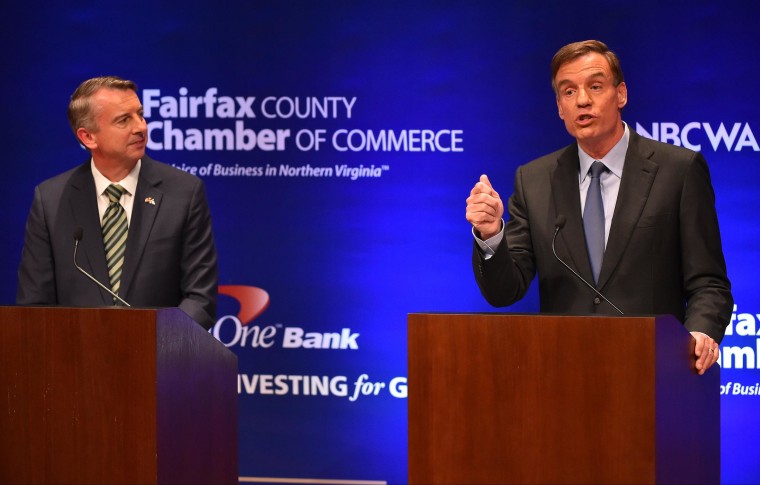Virginia Senate candidates Mark Warner and Ed Gillespie jostled Tuesday night over which man would be more willing to buck his party loyalties as a representative of the traditionally deep purple state.
Gillespie, the GOP challenger, sought to paint Warner as a partisan Democrat and stalwart Obama ally during the Chamber of Commerce debate, which was moderated by NBC's Chuck Todd and aired by WRC-TV.
"Governor Warner wouldn't recognize Senator Warner today," Gillespie said of Warner's previous job as the state's popular chief executive, during which he was widely lauded for his bipartisan accomplishments.
But Warner, the incumbent Democratic senator, countered that Gillespie's former role as a top GOP lobbyist and party leader make him a "partisan warrior" for the Republican Party.
"His whole career has been as a partisan political operative," he said of the former Republican National Committee head. "He says 'Elect me and then I'm suddenly going to be bipartisan?'"
A recent poll from the Wason Center for Public Policy at Christopher Newport University shows Warner leading Gillespie 51 percent to 39 percent.
During the debate, Warner highlighted his differences from Obama on the Keystone XL pipeline, on foreign policy -- arguing for a more aggressive response than the administration has enacted against ISIS -- and on reducing the deficit.
Asked if he believes Majority Leader Harry Reid is the best possible leader for Senate Democrats, Warner replied: "I think we could perhaps do better in both parties moving forward."
But Gillespie charged that Warner's votes don't reflect that distance.
"Senator Warner's press releases are very bipartisan but his floor votes are very party line," he said.
For his part, Gillespie suggested that the RNC's backing of a federal same-sex marriage ban during his tenure as chairman wasn't reflective of his personal views, and he said his party "went too far" in instituting mandatory minimum sentences for crimes.
But pressed about whether Mitch McConnell is the best leader of his party in the Senate, Gillespie offered a more positive assessment than Warner gave of Reid.
"I like Mitch McConnell and I take him at his word when he says he will open up the Senate floor to amendments, and that would be good for the process," he said.
Virginia has undergone dramatic demographic shifts in recent years that could help explain why this relatively sleepy race isn't one of this cycle's marquee Senate contests despite the state's historic battleground status.
Urban Suburb counties across the country have swung toward the Democrats in the last 12 years – the percentage voting Democratic in presidential races growing by four percentage points over that time – but the moves in Virginia are remarkable.
Between 2000 and 2013, Virginia’s population grew by more than 16% (compared to about 10% nationally) and the Urban Suburbs saw a lot of that growth. In a look at Loudon County early this year, the Wall Street Journal noted that many of the newcomers were from other left-leaning counties around the country.
That growth and the political change in the Northern Virginia suburbs combined with growing national left-right political divide may have pushed Virginia into a new place in the political dialogue. In a year where there is high dissatisfaction with a Democratic president and strong concerns that the country is on the wrong track, the relative lack of battleground status for Virginia’s race suggests that the larger demographic shifts in the state may have moved it out of the purple and into the blue.
Dante Chinni contributed to this report.
